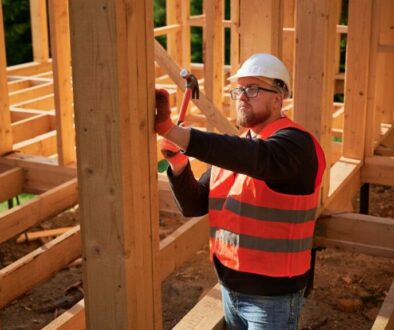What Are Caulking Skills?
Caulking is the process of sealing gaps or joints in buildings to prevent air or water from leaking in or out. It involves applying a material called caulk to the spaces between various surfaces, such as windows, doors, and walls. Caulking is a crucial element in maintaining the structural integrity of buildings, and it requires a particular set of skills to be done effectively.
Caulking Skills Examples
To become a skilled caulker, one must possess specific knowledge and expertise. Here are a few examples of the essential skills required to master caulking:
- Precision: Proper caulking requires precision to ensure that the materials are applied appropriately and evenly. A skilled caulker will have the ability to apply caulk in tight spaces without making a mess or leaving gaps. Achieving precision requires a steady hand, good eyesight, and the ability to work with small tools. A skilled caulker will also know how to adjust the pressure on the caulking gun to control the flow of the material, ensuring that it goes where it is needed and doesn’t spill over onto adjacent surfaces.
- Caulking techniques: Different caulking techniques are used for different kinds of surfaces. An experienced caulker will have a good understanding of different materials such as silicone, polyurethane, latex, and acrylic and will know how to apply them correctly. They will also know when to use a backer rod to fill large gaps and when to use a smoothing tool to achieve a clean finish. In addition, a skilled caulker will know how to remove old caulk and prepare surfaces for new caulk, ensuring that the new material adheres properly and lasts as long as possible.
- Problem-solving: A skilled caulker would be able to identify problem areas that require caulking and come up with effective solutions to solve them. For example, they might notice that water is seeping into a building through a gap in the foundation or that air is leaking around a window frame. They would then be able to determine the best type of caulk to use and the most effective way to apply it to solve the problem.
- Tools: A skilled caulker will have access to the necessary tools and equipment needed for the task at hand. The tools might include a caulking gun, scraper, and utility knife. They may also use a variety of other tools, such as a backer rod insertion tool, a smoothing tool, or a caulking removal tool. A skilled caulker will know how to use these tools safely and effectively, ensuring that the job is done right the first time.
As you can see, becoming a skilled caulker requires a combination of knowledge, experience, and attention to detail. Whether you are caulking a bathtub, a window frame, or a foundation, it is essential to have the right skills and tools to ensure that the job is done correctly. With the right training and practice, anyone can become a skilled caulker and achieve professional-quality results.
How Do You Improve Caulking Skills?
Improving caulking skills takes time and practice, but it is an essential skill to have in various industries. From construction and plumbing to woodworking and DIY projects, caulking is a crucial step in ensuring a job is done correctly. Here are some additional tips to help you improve your caulking skills:
- Training and Practice: The best way to improve caulking skills is to receive proper training and to practice regularly. Consider joining industry-specific classes, attending online courses or seminars, or even shadowing an experienced caulker on the job. This will provide you with hands-on experience and allow you to learn from professionals in the field.
- Research supplies: Understanding different materials such as silicone, polyurethane, latex, and acrylic can help achieve better results as different products have different strengths and weaknesses for specific applications. Take the time to research and compare different products to determine which one is best suited for your project.
- Experiment with Techniques: Try different caulking techniques or materials on small projects to see how they compare. This way, you can develop a personal preference that works best for your needs. For example, some people prefer using a caulking gun, while others prefer using their fingers to apply the caulk. Experimenting with different techniques will help you find what works best for you.
- Ask for Feedback: Feedback from experienced colleagues can help you identify areas for improvement and give you essential tips and tricks for moving ahead. Don’t be afraid to ask for feedback from your colleagues or supervisor. They may be able to offer valuable insights that you may not have considered before.
Improving your caulking skills can take time, but with practice and patience, you can become a pro. Remember to take the time to research different products and techniques, and don’t be afraid to ask for feedback from others. By doing so, you’ll be well on your way to mastering the art of caulking.
Why Do Employers Look For Caulking Skills?
The importance of caulking skills cannot be overemphasized. Here are a few reasons businesses and employers look for professionals with caulking skills:
- Maintaining Structural Integrity: The primary purpose of caulking is to maintain a building’s structural integrity, preventing air from entering and water from seeping through the walls and floors.
- Improved Energy Efficiency: Proper caulking can result in energy savings as it reduces the amount of hot or cold air that enters a building, reducing electricity bills and improving energy efficiency.
- Reducing Costs: Professional caulking can prevent problems like water damage and mold, which can save businesses thousands of dollars in repair costs.
- Better Aesthetics: Proper caulking can give buildings a professional, clean look enhancing curb appeal.
However, there are other reasons why employees with caulking skills are in high demand. One of the main reasons is that buildings require regular maintenance to ensure they remain in good condition. Caulking is one of the maintenance tasks that need to be done regularly to prevent damage to the building’s structure.
Another reason why caulking skills are essential is that they require a certain level of expertise to ensure that the job is done correctly. A professional with caulking skills will know what type of caulking material to use for each job, how to apply it correctly, and how to ensure that it lasts for a long time.
Moreover, employees with caulking skills are also in high demand because of the safety concerns associated with buildings. If caulking is not done correctly, it can lead to water damage, mold growth, and air leaks, which can compromise the building’s safety and structural integrity. Therefore, it is essential to hire professionals with caulking skills to ensure that the job is done correctly and safely.
Finally, caulking is not only necessary for commercial buildings but also for residential buildings. Homeowners also need to hire professionals with caulking skills to ensure that their homes are protected from the elements and that they remain energy-efficient. Therefore, employees with caulking skills are in high demand in both the commercial and residential sectors.
Caulking skills are essential to maintain the structural integrity of buildings, reduce energy costs, and prevent damage. With proper training and practice, individuals can improve their caulking skills, and this may open doors to several job opportunities. It is a crucial element that is often overlooked but plays a critical role in ensuring the longevity of a building.




